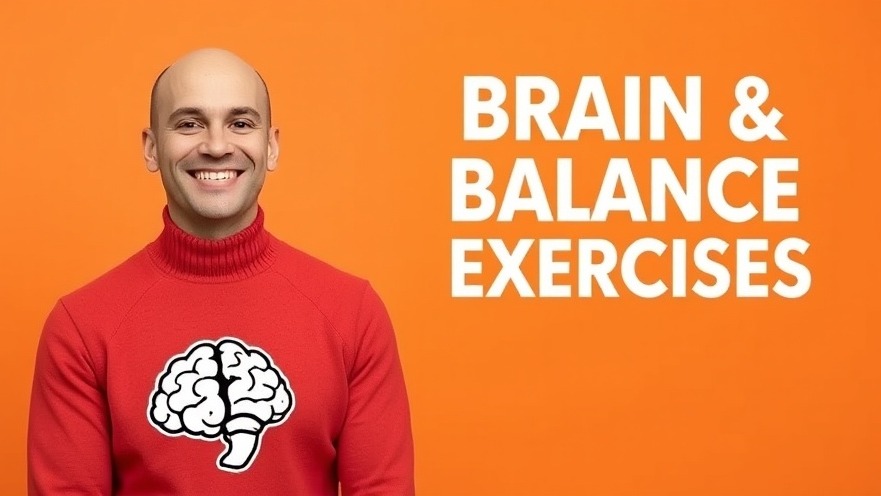
Unlocking Your Brain's Potential: A Simple Approach to Wellness
As we age, maintaining our cognitive and physical health becomes increasingly important. Dr. Alan Mandel’s recent video, This 60-Second Move Rebuilds Your Brain and Balance After 30, introduces an innovative approach that combines brain training and balance enhancement into a quick, one-minute daily exercise. Remarkably, this simple routine can significantly improve your stability, coordination, and overall well-being—something that doesn’t just benefit those already facing balance issues but also anyone looking to enhance their cognitive health and physical stability as they age.
In This 60-Second Move Rebuilds Your Brain and Balance After 30, Dr. Mandel highlights a simple yet effective routine that not only boosts balance but also supports cognitive health, prompting us to delve deeper into its benefits.
Why is Balance Training Crucial for Seniors?
After around the age of 30, many begin to experience a decline in the brain-body connection. Symptoms such as unsteady walking, decreased posture, and lack of coordination can manifest slowly and may go unnoticed at first. Engaging in balance training like Dr. Mandel's exercise can help recalibrate our neurological systems, preventing further decline. It strengthens stabilizer muscles, improves joint positioning, and helps create new neurological pathways that keep us alert and more stable.
Building Better Connections: The Science Behind the Exercise
The triangular movement routine described by Dr. Mandel activates sensory signals traveling through important brain pathways. These areas of the brain—specifically the cerebellum—are critical for posture and coordination. Over time, grappling with these stabilizing exercises can boost cognitive functions like memory, focus, and even emotional regulation. This is especially relevant as cognitive health in aging becomes a growing concern.
A Daily Routine: Implementing the One-Minute Exercise
The exercise itself is straightforward: standing near a wall or chair for balance, you shift your weight to one leg, lifting the other slightly off the ground, and then tracing a triangle with your elevated foot. Not only does this strengthen specific muscles, but it also engages and builds the brain's neural circuits responsible for balance. Dr. Mandel notes that this can be done with eyes open or closed for varying levels of challenge, making it an adaptable exercise suitable for all levels of mobility.
Beyond Balance: The Broader Impact on Mental Health
Integrating this simple exercise into your daily routine could also bring more than just balance benefits. It serves as an active way to improve mental wellness for seniors, positively affecting your sleep, anxiety levels, and overall emotional health. Many seniors experience mental health challenges such as depression and loneliness, and fostering connections—both physically through movement and socially through shared exercises—can alleviate these issues. Mindfulness exercises, including balance training, help cultivate a routine that encourages mental clarity and resilience in later life.
Incorporating Wellness Techniques into Daily Life
Coupling Dr. Mandel's balance exercise with mindfulness practices like deep breathing or yoga can create a holistic approach to mental wellness for seniors. Relaxation techniques and stress relief strategies, including meditation before bed, create an environment conducive to better sleep and emotional well-being. Cognitive exercises are invaluable not only in strengthening the body but also in enhancing mental acuity—even for those who may be facing the onset of dementia-related sleep issues.
The Path Forward: Embracing Change for Long-lasting Benefits
With just one minute a day dedicated to this balance exercise, you can activate numerous neural connections essential for your health. While this movement may seem minor, the benefits are profound—particularly as you approach or surpass your 30s. Enhanced stability translates into improved quality of life, making even everyday activities safer and easier to manage. As we continue to embrace novel ways to approach wellness and cognitive health, sharing exercises like this with friends and family becomes paramount.
In conclusion, we encourage you to adopt Dr. Mandel’s one-minute daily exercise, making it a crucial part of your routine. Improving your brain's health and your balance may be just a few steps away—taking proactive actions to secure your mental well-being has never been more vital.
 Add Element
Add Element  Add Row
Add Row 



 Add Row
Add Row  Add
Add 


Write A Comment